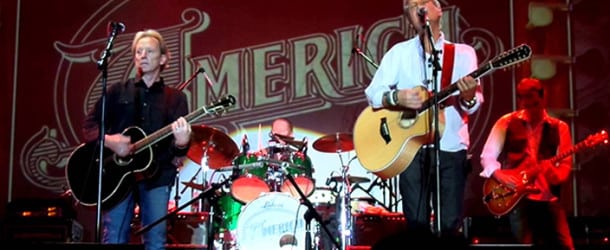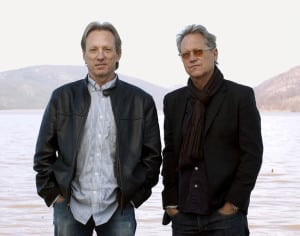By Renn Loren
With their close-knit three-part harmonies, ethereal double-tracked mood-drenched lead vocals, and rhythmically strummed acoustic guitars, America were the very embodiment of acoustic rock and soft rock. With a sound as comfortable and relaxed as a favorite pair of jeans and flannel shirt, the songs of America —“A Horse with No Name,” “Lonely People,” “Sandman,” “I Need You,” “Ventura Highway” and “Sister Golden Hair” — were omnipresent on the radios and the cassette players of the 1970s. Many of these songs are still heard on classic rock stations today.
Formed in England in 1970 by multi-instrumentalists Dewey Bunnell, Dan Peek and Gerry Beckley, the trio first met as sons of U.S. Air Force personnel stationed in London. Originally a quartet called Daze, they soon became a trio and re-launched themselves as America in homage to the country of their origin.
Championed by Jeff Dexter and former Cliff Richard’s guitarist Ian Samwell, the fledgling trio was given the opening act spot for artists such as The Who, Elton John, Patto and The Chalk Farm Salvation Army Band & Choir at the infamous Roundhouse, Chalk Farm. In fact, it was Samwell who persuaded the trio to perfect their harmonic acoustic style. Samwell and Dexter also produced the first eponymously titled America album.
In England, it was customary to release singles independently of albums. As such, the debut album released in 1971 didn’t originally feature its most well-known track upon initial release, and the album underperformed as a result.
Warner Brothers was a bit reticent about launching America with the Beckley-authored “I Need You,” which was a ballad, and asked the group to come up with more material. Originally called “The Desert Song” by its author Dewey Bunnell, “A Horse with No Name” began life as an attempt to capture the feel of the hot, dry desert depicted in a Salvador Dalí painting that was in the studio, and the strange horse in an M.C. Escher picture. Bunnell intertwined these visual cues with memories of his childhood travels through the deserts of Arizona and New Mexico, made when his family lived at Vandenberg Air Force Base.
Although banned by some U.S. radio stations due to a suspected reference to heroin, “A Horse with No Name” galloped to No. 1 on the Billboard Hot 100, with the album quickly gaining platinum status. In the band’s adopted home country, the single rose to No. 3 months before appearing on the U.S. charts. Oddly, it would be the band’s only Top 40 in the UK.
Many listeners initially thought “A Horse with No Name” was performed by Neil Young. Bunnell admitted being strongly inspired by Young as well as Crosby, Stills, Nash & Young. However, he felt that the sonic resemblance was as much in the acoustic rhythm structures and arrangement as it was in his vocal delivery. By grand coincidence, it was Young’s “Heart of Gold” that “A Horse with No Name” replaced at the top spot in the Billboard Hot 100. The single went on to sell over one million copies.
Beckley’s “I Need You” followed, climbing to No. 9.
America’s sophomore album Homecoming featured their third straight Top 10 hit. It was another Bunnell composition: a breezy ode to California’s “Ventura Highway.” Peek’s “Don’t Cross the River” and Beckley’s “Only in Your Heart” were minor hits from Homecoming; they nonetheless established America as a folk-rock force with which to be reckoned.
Their third outing was the ill-fated somewhat experimental Hat Trick album, which only yielded the minor hit “Muskrat Love” — a song that would later become a Top 10 for Captain and Tennille. The band had taken to naming their albums with titles starting with the letter “H.”
Legendary Beatles producer George Martin and engineer Geoff Emerick were called on to produce Holiday. Released in 1974, the album yielded the Top 10 hits “Tin Man” (by Bunnell) and “Lonely People” (by Peek — only credited Top 10).
The next Martin-produced album Hearts contained the Beckley-penned No. 1 “Sister Golden Hair,” which featured a George Harrison slide guitar riff. The follow-up single, Beckley’s ballad “Daisy Jane,” went into the Top 20. Peek’s reggae-influenced “Woman Tonight” was a third hit.
The same year, the group released History: America’s Greatest Hits, which would eventually sell over five million copies.
1976’s Hideaway would mark the end of America’s chart successes. The drought would last until “You Can Do Magic” a song on 1982’s View from the Ground penned by outsider and former Argent guitarist Russ Ballard. It reached No. 8 on the Billboard pop singles chart.
From 1985-98 the duo of Beckley and Bunnell would focus on America as a live act, playing over 100 shows a year around the world.
In 2005, Beckley began connecting with Adam Schlesinger of the indie rock band Fountains of Wayne. The two were mutual fans, and the subsequent exchange of songs between them resulted in their recording a few tracks together. These recordings caught the attention of SonyBMG’s new Burgundy Records label, which was impressed by the quality of the material and intrigued by the possibility of pairing America with other independent artists. The company contracted America to record a new album with Schlesinger and his musical partner, James Iha, formerly of The Smashing Pumpkins, at the production helm. Entitled Here & Now (2007), it would be America’s first major-label studio album since Perspective in 1984.
The recording sessions featured Ryan Adams, Ben Kweller, Stephen Bishop, Rusty Young, and members of the groups Nada Surf and My Morning Jacket. With Here & Now, America attracted publicity unknown to the group since the early 1980s.
The release was well received by critics, and Here & Now went to No. 52 on the Billboard charts. Back Pages followed in 2011; it featured covers by artists such as Bob Dylan, Joni Mitchell, Adam Schlesinger and the Gin Blossoms. — Golden Nugget Casino — Friday, July 1 — 8:30 pm
















Comments are closed.